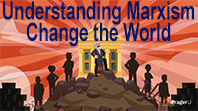America's Next Generation Marxism
Book review of:
NextGen Marxism: What It Is and How to Combat It
by Mike Gonzalez and Catherine Cornell Gorka
Encounter Books, 2024, 328 pages
ISBN-10: 1641773537
ISBN-13: 978-1641773539
Amazon: NextGen Marxism
Barnes & Noble: NextGen Marxism
Many believe that America is in decline: political parties are engaged in lawfare against their opponents, our borders are wide open, we have incurred odious debt. Our society is crumbling. Individuals are characterized predominantly by their race and sexuality, and we see ever-increasing displays of anti-semitism.
The book NextGen Marxism describes how these problems derive from Leftist Marxism and how our decline is deliberately engineered according to Marxist principles. If you wonder where we are and how we got here, read this book for a lucid explanation.
The authors state that:
This book makes the case that the social upheaval we are experiencing in the United States today is the result of a zero-sum view of the world, a world of irreconcilable antagonisms, one in which the open exchange of ideas is replaced by a rigid orthodoxy, in which there is no room for dissent, in which people are reduced to their skin color or sexual orientation...
With this book, we strive to explain that liberals who want to improve society, but not redo it, have as much an interest in fighting NextGen Marxism as do conservatives whose interest is to conserve tradition.
The authors adeptly describe the history of Marxism and those who have promoted it, and how it has been adopted as a destructive paradigm by America's Left.
Marxism
Marxism still holds sway with Leftists, who ignore the tragic outcomes of failed experiments with totalitarianism. The authors write:
It is baffling to many that an ideology with such a proven track record of failure, leaving such a wake of human destruction, can still have any appeal at all. But somehow, against all reason, it does.
... we know all too well from the Soviet Union, China, Cuba, Venezuela, North Korea, and North Vietnam - to name just a few examples - that tyranny is the inevitable outcome of utopian aspiration...
Marxism, as implemented by Vladimir Lenin in the Bolshevik Revolution of 1917, is the proof of this par excellence. In just the first few years of the revolution, hundreds of thousands of adversaries, class enemies, rebellious workers, peasants, kulaks (landowning farmers), and Cossacks were murdered, including many of those who had themselves been supporters and instigators of the revolution...
Between 1917 and the Soviet Union's dissolution, revolution and its promised utopia were used to justify the deaths of twenty million souls - a conservative estimate.
The authors continue to explain how, in spite of these demonstrated failures, Marxism was implemented:
When Marxism was finally instituted as a comprehensive national program in Bolshevik Russia, it did so not as the bottom-up revolution that Marx so confidently predicted but rather as a top-down imposition by an elite, using extreme instruments of force, violence, and social control. This explains how Marxism was finally implemented after seventy years in the wilderness, first in Russia, then in China, Cuba, North Korea, and Vietnam.
In other words, no one voted for Marxism; rather it was imposed upon them.
American Marxism Today
Traditional Marxism considered man to be a purely economic being who would ultimately revolt against their capitalist overlords. As capitalism was destroyed, Marxism would take its place. But in America, capitalism has worked well for the working class, allowing them to achieve a remarkable degree of prosperity. They had no economic reason to revolt.
American Marxism today attempts to fragment and destroy capitalism by pitting classes of people against each other. The authors observe that:
With the publication of The Communist Manifesto in 1848, Marx and Engels described a world defined by class struggles - struggles between oppressor and oppressed...
Today's cultural Marxists use race, sex, climate, or any number of social issues to instill in the young a sense of grievance against the existing system and thus stoke an urge to reject tradition and opt for radical change...
It is the cultural Marxism of Gramsci - the idea that to obtain civilizational transformation, you must first undermine the existing culture...
Today's strategy is thus being carried out by cultural Marxists - that is, revolutionaries who agree with Gramsci that, at least in the West, revolution can come only after years of cultural indoctrination, dismantling society's existing cultural narrative and instilling a new one, rather than relying on economic or social fissures to spark revolt.
The book does contain one glaring error. It references the "killing of George Floyd by Minneapolis police officer Derek Chauvin." We now know that Floyd died because his blood contained a multiple of the fatal dose of fentanyl, and that Chauvin correctly followed police procedures.
Marxism had never been able to win in the open marketplace of ideas. While NextGen Marxism presents the grim reality of America's engineered decline, it isn't monotonically depressing. While we need to understand how and why we got so far into the "fundamental transformation of America", the authors optimistically posit that we can work together to restore America as a great nation.
Read this book! Highly recommended.
Must read book: American Marxism
'American Marxism' Is Mark Levin's Most Important Book Ever
Cultural Marxism, Political Correctness, and Critical Theory
Marxism: Key To Understanding Leftists
Cultural Marxism and Critical Theory - The Importance of the Narrative
Video on the long march of Marxism through American institutions
Leftism - a Hegelian spiral toward Marxism
How and Why the Democrat Party Hates America








